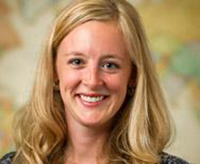
Laura Miller grew up in a big, loving family, but her research at Notre Dame focuses on children who were less fortunate.
“I learned from my own experiences how much your family and childhood experiences can profoundly affect your life,” Miller says. “While I have been very blessed in my own life, having an awareness of how a supportive and warm family affected my development motivated me to work with children who didn’t necessarily have the advantage of that experience.”
Miller, a new faculty hire in the Department of Psychology and the Kroc Institute for International Peace Studies, says her work integrates the quantitative and qualitative evaluations of children’s reactions to traumatic experiences, including exposure to violence.
“It’s a common assumption that very young children don’t have the cognitive ability to express clear beliefs, attitudes and fears about the violence they’ve witnessed, but it’s quite remarkable how acutely aware and articulate young children are of their experiences.”
Consequences and Coping
One challenge, Miller says, is helping children and families understand how far they have already come in overcoming hardship.
“Mental health difficulties and the sublimation inherent in a lot of violent traumatic experiences can leave people feeling weakened and sometimes blinded to the fact that they may have done some truly incredible thing just to save their own life or the life of another person. But that strength is not something they can always recognize in themselves.”
Together with Kathryn Howell at the University of Memphis and Erin Hunter at the University of Michigan, Miller is researching how childhood exposure to violence may lead to substance use and dating violence in the college years. The study also examines the roles of religious and spiritual coping as they relate to early trauma.
Miller also is part of a collaborative effort underway in the United States and Sweden. The team is examining rates of childhood exposure to violence in Sweden and how various environmental contexts and events following the traumatic experiences protect children from—or put them at risk for—mental health problems in adulthood.
“For example,” Miller says, “one of our projects looks at how intimate partner violence disrupts parental warmth and how that affects adult romantic relationship quality and life satisfaction.”
Violence and Peace
Miller’s work in the realm of peace studies plays a fundamental role in her research on familial violence.
“I conceptualize questions by thinking about how we need to create change at multiple levels—through direct work with children, but also through building supports for families, communities, and changing attitudes about violence at a societal level.”
Miller says it is important to examine the resilience of victims in addition to understanding the causes and effects of violent trauma.
“Although many of these children and families are experiencing a lot of hardship as a result of their traumatic experiences, there is a lot of strength too, and peace studies places a strong emphasis on the importance of leveraging and developing those strengths in mobilizing change and developing peacebuilding initiatives .”
Miller believes both a global and local perspective on these issues is critical to her work.
“There is a temptation to focus on violence as an issue that is distant from us, that it’s much worse elsewhere. In reality, the rates of violence in the south side of Chicago are similar (in some cases) to post-conflict African countries. The frequency of intimate partner violence in the United States is one of the highest of any developed nation. So yes, we should work to address violence in the global sphere, but the issues are also right at our backdoor.
“Neither can be ignored, and the research we do here can inform a lot of our practices in international conflict settings abroad.”
A Moral Scope
This semester and next, Miller is teaching Psychology of Peace, which explores the root causes of violence and peace through case study material from the United States and abroad.
Miller’s appointment to the Notre Dame faculty also marks a return to campus for 2008 graduate.
“Going to Catholic schools was an important part of my formation, and I have a strong commitment to supporting it,” Miller says.
“Notre Dame’s mission motivates its students and faculty to conceptualize learning, research and teaching within a moral scope that is useful to moving research from something that is solely an academic exercise to something that contributes to real positive change in our world.”


